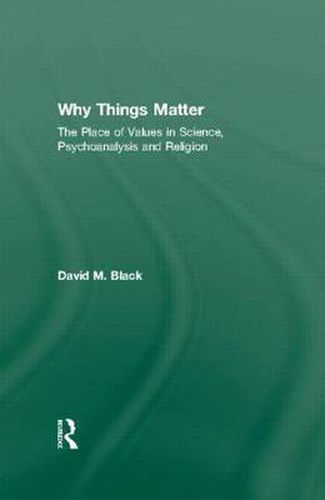Readings Newsletter
Become a Readings Member to make your shopping experience even easier.
Sign in or sign up for free!
You’re not far away from qualifying for FREE standard shipping within Australia
You’ve qualified for FREE standard shipping within Australia
The cart is loading…






In this book, David M. Black asks questions such as ‘why do we care?’ and ‘what gives our values power?’ using ideas from psychoanalysis and its adjacent sciences such as neuroscience and evolutionary biology in order to do so. Why Things Matter explores how the comparatively new scientific discipline of consciousness studies requires us to recognize that subjectivity is as irreducible a feature of the world as matter and energy. Necessarily inter-disciplinary, this book draws on science, philosophy and the history of religion to argue that there can be influential values which are not based exclusively on biological need or capricious life-style choices. It suggests that many recent scientific critics of religion, including Freud, have failed to see clearly the issues at stake. This book will be key reading for psychoanalysts and psychotherapists as well as counsellors with an interest in the basis of religious feeling and in moral and aesthetic values. The book will also be of interest to scholars of psychoanalysis, philosophy and religion.
$9.00 standard shipping within Australia
FREE standard shipping within Australia for orders over $100.00
Express & International shipping calculated at checkout
In this book, David M. Black asks questions such as ‘why do we care?’ and ‘what gives our values power?’ using ideas from psychoanalysis and its adjacent sciences such as neuroscience and evolutionary biology in order to do so. Why Things Matter explores how the comparatively new scientific discipline of consciousness studies requires us to recognize that subjectivity is as irreducible a feature of the world as matter and energy. Necessarily inter-disciplinary, this book draws on science, philosophy and the history of religion to argue that there can be influential values which are not based exclusively on biological need or capricious life-style choices. It suggests that many recent scientific critics of religion, including Freud, have failed to see clearly the issues at stake. This book will be key reading for psychoanalysts and psychotherapists as well as counsellors with an interest in the basis of religious feeling and in moral and aesthetic values. The book will also be of interest to scholars of psychoanalysis, philosophy and religion.